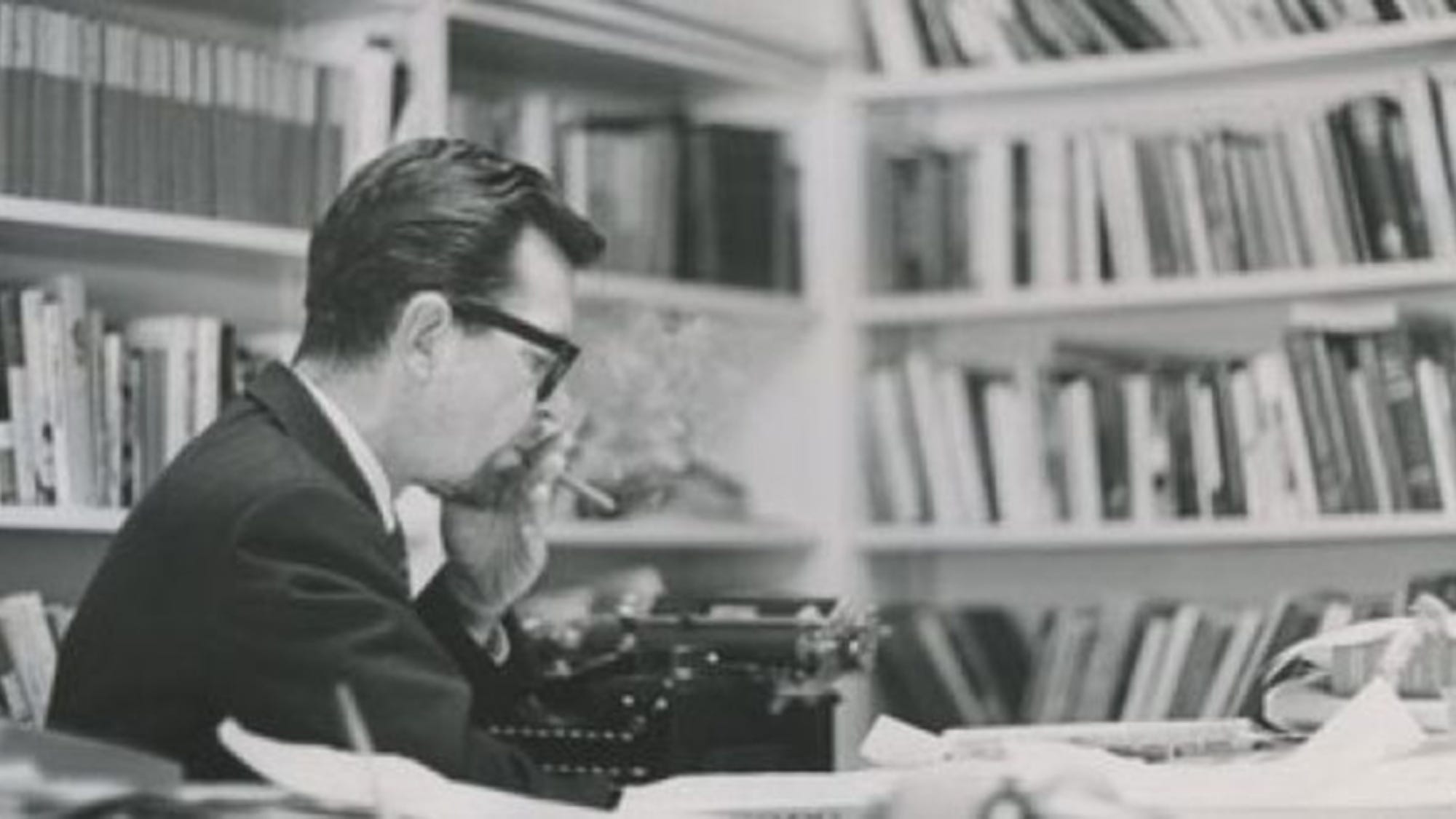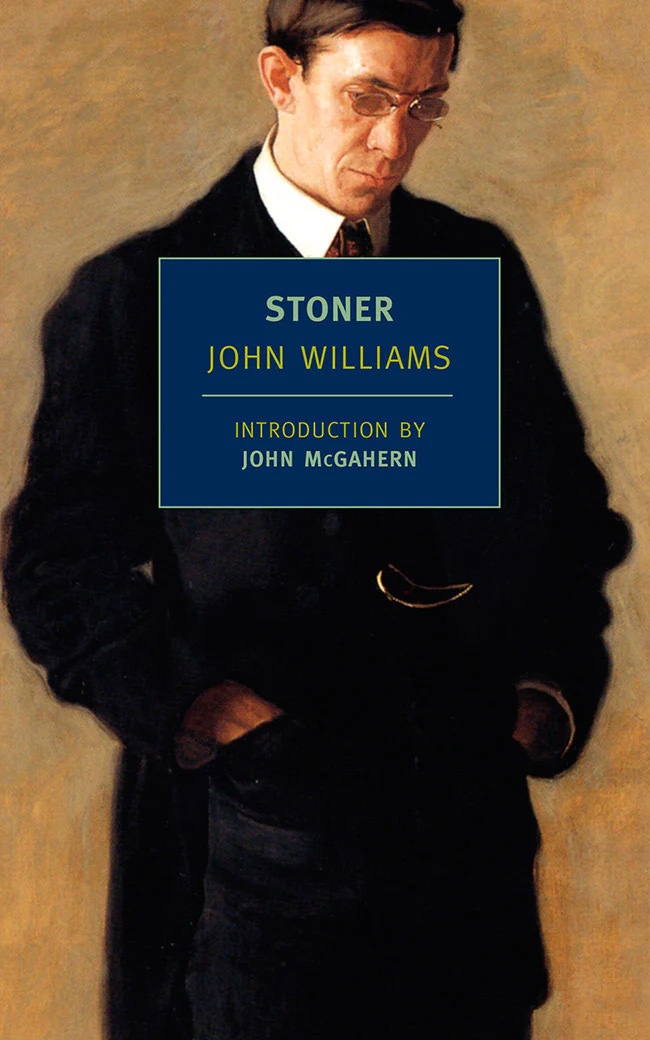Stoner by John Williams
 John Williams.
John Williams.
NOTE: Chock full of SPOILERS!
Poor William Stoner. His one break in life is to escape the farm to attend the University of Missouri where he discovers a love of literature and scholarship. After that, just about anything goes against him.
First comes an unfortunate marriage. His wife Edith is alternately neurotic, hysterical, distant, and sniping. She’s repulsed by physical intimacy except for a brief lustful period that results in their only child. She lapses into bed-ridden depression, leaving Stoner to care for the baby single-handedly. When father and daughter develop a loving relationship, Edith intervenes to separate them then dismantles Stoner’s study to use as an art studio.
Stoner makes an enemy of Professor Lomax and his favored student Walker, both crippled. Stoner feels bound by integrity to oppose the academically fraudulent, if rhetorically talented, Walker. Lomax regards Stoner as unforgivably prejudiced. When Lomax becomes head of the English department, he assigns Stoner the worst possible schedule consisting entirely of introductory classes.
Stoner finds true love in the form of Katherine Driscoll, a smart student. Chapter 13 begins, “In his extreme youth Stoner had thought of love as an absolute state of being to which, if one were lucky, one might find access; in his maturity he had decided it was the heaven of a false religion, toward which one ought to gaze with an amused disbelief, a gently familiar contempt, and an embarrassed nostalgia. Now in his middle age he began to know that it was neither a state of grace nor an illusion; he saw it as a human act of becoming, a condition that was invented and modified moment by moment and day by day, by the will and the intelligence and the heart.” Of course, it’s only a matter of time before that dream, too, is shattered.

Stoner’s two friends are the clever, acerbic Dave Masters and the solid, loyal Gordon Finch. Both enlist when America joins the war. Masters is killed in France. What to make of Dave Masters’ discourse early in the book on the nature of the University? It is “an asylum… for the infirm, the aged, the discontent, and the otherwise incompetent.” He continues, “But, as bad as we are, we’re better than those on the outside, in the muck, the poor bastards of the world. We do no harm, we say what we want, and we get paid for it; and that’s a triumph of natural virtue, or pretty damn close to it.”
Those words make a ghostly return later. Stoner remembers “…something about the University being an asylum, a refuge from the world, for the dispossessed, the crippled. But he didn’t mean Walker. Dave would have thought of Walker as - as the world. And we can’t let him in. For, if we do, we become just like the world, just as unreal, just as… The only hope we have is to keep him out.” Phony, Holden Caulfield would have said.
What is it that differentiates Stoner, Masters, and Finch from Walker, Lomax, and Edith? There’s a scene when Stoner and Edith host a party. Loosened by liquor, Lomax “…spoke of the loneliness of his childhood… of the early shame which had no source that he could understand and no defense that he could muster.” (p100) Lomax and Edith share a kiss and a strange moment where they seem to recognize some kind of kinship with one another. Later, Stoner tries to make peace with Lomax who will have none of it. Williams writes, “Lomax was gazing intently at some papers on his desk; his face was red, and he seemed to be struggling with himself. Stoner realized that what he saw was not anger but shame.” (p182) Edith is so repressed that she is physically ill on their wedding night. Maybe what she and Lomax share is shame.
Another hint is in a quote from José Ortega y Gasset, which Williams considered using as Stoner’s motto: “A hero is a man who wants to be himself.”
For a modern reader, there are interesting resonances with campus dramas playing out in today’s headlines - protests, forced resignations, along with competing claims of prejudice, victimhood, and intellectual dishonesty. It’s barely possible to imagine an intended political undercurrent in book where the personal and internal loom so large and where momentous events seem distant, only noticed in passing.
For most of the book, Stoner refuses to fight for anything. He doesn’t go to war. He accepts a failed marriage, his wife’s cruel scheming, and the punishments meted out by the vengeful Lomax. He abandons his true love with Katherine when their affair is found out. His passivity gets so disturbing for the reader that you can’t help cheering for Stoner when he finally stands up for himself, albeit in a small way, by teaching graduate material to freshman he is assigned.
Why does Stoner choose to take a stand over Walker’s evaluation? Why this and not the daughter or lover? You get glimpses of Edith’s puritanical upbringing and hatred for her own father, but her character doesn’t quite add up. Rather than being a complete person, it feels like her only purpose is to torment Stoner.
I started Stoner expecting the story of a nondescript character with a beautiful inner life, but that’s not what I found. Archer Sloane, Stoner’s mentor, comes closer to the mark. “You must remember what you are and what you have chosen to become, and the significance of what you are doing. There are wars and defeats and victories of the human race that are not military and that are not recorded in the annals of history.” Stoner’s defeats and victories are of that quiet kind.
The novel is infused with midwestern American stoicism in which life is suffering and your purpose is to endure. Don’t complain, don’t try to change your fate; just endure. Stoner might be seen as a academic version of the biblical story of Job, except that it’s not so much a test of faith as a test of endurance.
For a novel about the life of the mind in which the disjunction between interior state and external appearence plays a major role, we get precious little access to Stoner’s interior - possibly because he refuses to look there himself. There are several scenes in which Stoner observes himself doing things without any insight into why he’s doing them, as if his own actions simply happen to him. Why doesn’t he seek new employment or run away with his lover? How could he abandon his daughter without even trying to defend her? Stoner’s lack of agency frustrates the reader and maybe that’s the point. Williams described his character as “a kind of saint … who finds no meaning in the world or in himself, but he does find meaning and a kind of victory in the honest and dogged pursuit of his profession.”